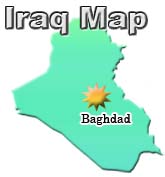Iraqis go to polls amid tight security
 Baghdad - Iraqis cast their ballots Saturday in provincial elections in the largest elections yet in the country's history, as receding violence created conditions which were more secure than for the national elections held in 2005.
Baghdad - Iraqis cast their ballots Saturday in provincial elections in the largest elections yet in the country's history, as receding violence created conditions which were more secure than for the national elections held in 2005.
Despite tight security arrangements, violence was reported during the day. Four mortars were fired at polling stations in Tikrit, the hometown of former dictator Saddam Hussein, but no one was hurt, the news agency Voices of Iraq (VOI) reported.
In another incident, one person was killed and another wounded during a fight at the entrance of a polling center in Sadr city in eastern Baghdad, according to a local security source.
Elections being held in 14 of Iraq's 18 provinces were extended by an hour to allow all voters to cast their ballots, Iraqi media reported.
Polling stations were to close at 6 pm (1500 GMT) instead of at 5 pm (1400 GMT) as originally scheduled.
Prime Minister Nuri al-Maliki in the afternoon meanwhile also lifted a ban, initially ordered for the day, on vehicles in the inner city.
To minimize the risk of terrorist attacks, police had imposed driving bans in some cities. Women also had to turn over their purses on entering polling stations and mobile phones also were not allowed.
About 14,400 candidates were contesting 440 provincial seats, creating fierce competition among candidates that was expected to lead to greater representation of the country's sects.
Sunnis who boycotted the last elections in 2005, delivering disproportionate representation for Kurds and Shiites, were competing for more seats.
The elections present a major test to Iraqi forces as the administration of US President Barak Obama prepares a troop pullout plan. Only two days before the elections, three Sunni candidates were murdered in different places in Iraq.
In the restive Diyala province, security forces imposed a curfew a day before the elections as the Independent Higher Electoral Commission announced a halt to electoral campaigning and the removal of all electoral banners and posters.
Security forces in Diyala arrested five persons Saturday who were suspected of plotting an attack against a polling center, a security source said.
The arrests were made on the basis of intelligence reports, the source told VOI.
Iraqis were choosing representatives in 14 out of Iraq's 18 provinces. The three northern Kurdistan provinces and the long disputed Kirkuk will not go to vote.
The latter in particular has a multiethnic population of Kurds, Arabs and Turkman who have been clashing over control of the oil-rich province. Iraq's central government decided to postpone the four provinces' elections to a later date.
Apart from violence, election fraud was another threat. Polling stations in remote villages and rural areas might have few or no observers compared to bigger cities.
Also, many candidates have been buying peoples' votes with hefty amounts of money, triggering criticism of the Electoral Commission for not taking adequate steps against it.
While turnout was expected to be high, many Iraqis are not optimistic that the elections would change much.
"I don't expect a radical change in Iraq's current situation," said 55-year-old civil servant Mohamed Shaker. "Powerful blocs will be ahead in the coming four years, and this matter worries us so much." (dpa)